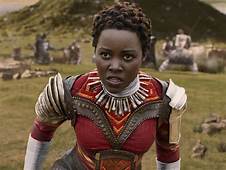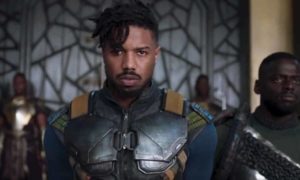BLACK PANTHER is the standard by which all other superhero movies this year will be measured. Maybe this decade. Showcasing the expected show-stopping special effects, a rich mythology from the Marvel comic on which it is based, and plenty of rousing action that is both imaginative (weaponized rhinoceroses) and genuinely suspenseful, it gets the most basic element of a truly great flick right: terrific characters. Director/co-writer Ryan Coogler’s background is in small, deeply moving indie filmmaking (FRUITVALE STATION), and he has translated that attention to human detail to this mega-budget extravaganza. The result is a film in which people are complex, and so are the decisions that they make given the circumstances in which they find themselves.
A brief prologue introduces us to the African kingdom of Wakanda. Cloaked in secrecy, it has assumed a secret identity of a poor third-world country when, in fact, it is sitting on a mountain of the world’s most precious natural resource, vibranium. Thanks to an asteroid that hit that part of the continent millions of years ago, there is a mountain of the stuff, enough to last a thousand years, and also the jump-start the Wakandians advanced technology, the which they are keeping from the rest of the world lest it fall into the wrong hands. Of course it does. In a lesser film, that would be the entire plot, but Coogler is after more than the expected. He hints that there is more than this McGuffin of stolen vibrinium at stake by making the wrong hands in question, or rather wrong hand, a goggle-eyed one-armed arms trader, Ulysses Klaue (Andy Serkis) the least developed character in the film, though still a vibrant one. Lewd, crude, and a racist, he is the roiling id of everything wrong with humanity, right down to the weapon of mass destruction where is left arm used to be.
Coogler also hints at twists to come as that prologue progresses, setting up a network of Wakandian spies around the world, in this case Coogler’s hometown of Oakland, and a royal family in which all is not what it should be.
 Picking up where CAPTAIN AMERICA: CIVIL WAR left the royal family of Wakanda, Prince T’Challa (Chadwick Bozeman) becomes king after his father (John Kani) is assassinated. Before the festivities and rituals that will make him the rightful ruler of Wakanda, T’Challa can commence, though, he insists on bringing back his ex, Nakia (Lupita Nyong’o) back to Wakanda from her mission to rescue the oppressed in the outside world. He may have superpowers. He may be royalty, but this woman with a social conscience reduces him to tongue-tied bashfulness. Even after he’s single-handedly taken out a convoy of kidnappers. And here’s another hint from Coogler. The women in this film are not your usual eye-candy. They are powerful, and they are unapologetic about it.
Picking up where CAPTAIN AMERICA: CIVIL WAR left the royal family of Wakanda, Prince T’Challa (Chadwick Bozeman) becomes king after his father (John Kani) is assassinated. Before the festivities and rituals that will make him the rightful ruler of Wakanda, T’Challa can commence, though, he insists on bringing back his ex, Nakia (Lupita Nyong’o) back to Wakanda from her mission to rescue the oppressed in the outside world. He may have superpowers. He may be royalty, but this woman with a social conscience reduces him to tongue-tied bashfulness. Even after he’s single-handedly taken out a convoy of kidnappers. And here’s another hint from Coogler. The women in this film are not your usual eye-candy. They are powerful, and they are unapologetic about it.
To become king, T’Challa surrenders his super powers, courtesy of a mysterious heart-shaped herb, during the ceremony presided over by Zuri (Forest Whitaker), takes on a Wankandian challenger from to the throne, and is restored to his old self by way of that ci-mentioned herb and a ritual of dying and being reborn wherein he visits the spirit world and gets a last few words of advice from his dead father. Then he’s off to stop Klaue, pronounced claw, and settle into the business of keeping his country safe from the influence of the outside world.

Michael B. Jordan
Wait, isn’t that isolationism? Is there something fundamentally wrong with refusing to take in refugees or sharing their technology with people it could help? Coogler goes there, and it’s a discomfiting place when it’s the hero championing that view in order to preserve what he considers good about his kingdom. Plus, it’s the villain who, with a mysterious partner (Michael B Jordan), offers payback for cultural theft by stealing a stray bit of vibrinium from the British museum that now owns it (after an explorer appropriated it a few centuries back).
T’Challa is the king, but the revolutionary subtext is that while he may be giving the orders, it’s the women around him who make them happen. From the general of his female bodygards, Okoye (Danai Gurira) gaining him entrance into the underground Korean casino, and then becoming a blur of speak-wielding red chiffon when the inevitable melee ensues, to the final climactic battle (of course there’s one, it’s an indispensable trope) where the female warriors carry the day, to Shuri (Letitia Wright) T’Challa’s sister who is impatient with tradition and brimming with the technological brilliance that makes T’Challa’s exploits, and his Black Panther suit, possible, the real power resides in the distaff side of the equation, something that T’Challa accepts as the norm. There is also the delicious irony of the white sidekick, in this case Martin Freeman sporting an American accent as the CIA agent swept up into the intrigue with suitable bemusement. In neither case is there anything strident or didactic, just the norm for this universe.

Chadwick Boseman
BLACK PANTHER balances the mystical and profane elements of the story, giving them equal weight in a challenging story in which the definitions of wisdom and of compassion become the real struggle. Throughout, Bozeman gives a performance of great nuance as well as great power, which is far more engrossing than stalwart perfection could ever be. BLACK PANTHER without its futuristic city, or elaborate battles would still be an engrossing, though-provoking film.
This movie was Masterfully Written and Directed. The acting was Superb.
Some action sequences are really well choreographed, for instance a long one shot action scene inside a casino and a subsequent car chasing sequence, which is quite great.